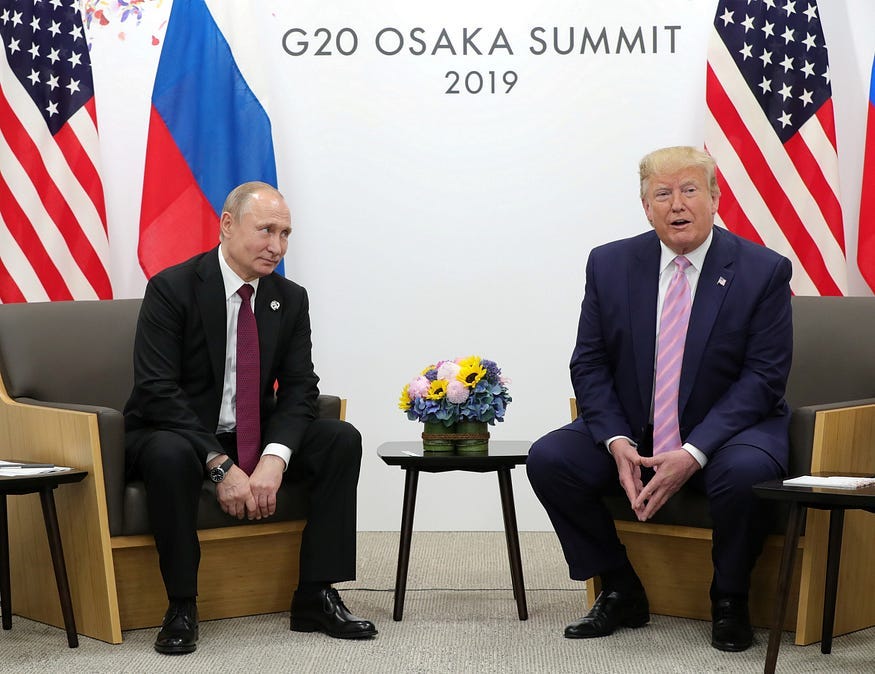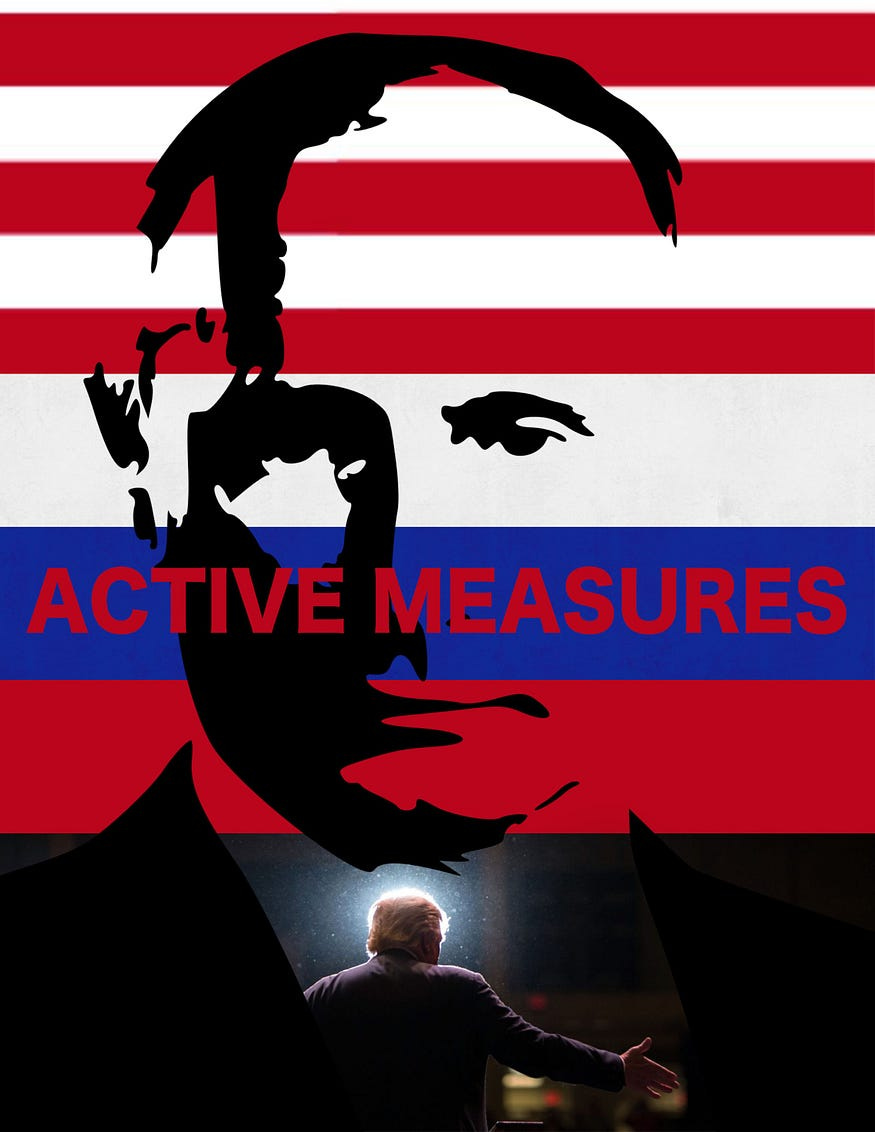Is Donald J Trump the Perfect “Manchurian Candidate” for Vladimir Putin's Active Measures?
Exploring Donald Trump’s Alleged Involvement in Russian Active Measures: A Deep Dive into the Financial Deals, Political Connections, and Controversial Actions that Raise Questions About Compromise an
A “Manchurian Candidate” is a term used to describe a person who has been brainwashed, manipulated, or covertly controlled by external forces to act against their own country’s interests, often without their knowledge. The term originates from the 1959 novel “The Manchurian Candidate” by Richard Condon, which was later adapted into films. In modern usage, it can refer to any political figure suspected of being unduly influenced or manipulated by foreign powers to serve their agenda.
In political discussions, it often carries a connotation of conspiracy or covert influence.
Since the 1990s, Donald Trump’s actions have aligned with several objectives outlined in Russian “active measures” strategies, which aim to destabilize Western democracies from within. This alignment has sparked debates over whether Trump could be a “Manchurian Candidate” — a figure manipulated or influenced to serve foreign interests.
Aligning with Russian “Active Measures”
Donald Trump’s actions since his business dealings in Russia during the 1990s have often mirrored tactics outlined in Russian “active measures” strategies, aimed at destabilizing Western democracies from within. This alignment has sparked debates over whether Trump could be a “Manchurian Candidate” — a figure manipulated or influenced to serve foreign interests.
1. Financial Vulnerabilities and Suspicious Deals
From the 1990s onwards, Trump’s organization pivoted from traditional real estate development to a brand-focused model, licensing the “Trump” name globally. This shift coincided with periods of financial distress, where Trump faced multiple bankruptcies and a dire need for cash. Deals in geopolitically sensitive regions, such as Georgia, and involvement with individuals connected to Russian oligarchs, were facilitated through complex offshore structures, which raises questions about the true nature of these financial arrangements. Trump Tower was allegedly a hotspot for Russian money laundering, suggesting deeper financial entanglements.
2. Exploiting Business Weaknesses
The Russians have a history of targeting individuals with business resources, shady morals, and political ambitions — traits that align with Trump’s profile. Trump’s real estate ventures, especially those in corrupt regions or with ties to Russian interests, exemplify this tactic. Deals involving oligarchs, Russian-backed financing, and money laundering activities appear as strategic moves by Russia to gain leverage over Trump, especially during times when his business needed substantial financial support.
3. Behavioral Patterns Favoring Russia
Trump’s actions and rhetoric frequently aligned with Russian geopolitical goals. His threats to leave NATO and his isolationist “America First” approach undermined Western alliances, aligning with Russia’s aim to weaken NATO. Public admiration for authoritarian figures like Putin and controversial policy decisions, such as the withdrawal of U.S. troops from Syria and negotiation with the Taliban, further weakened U.S. strategic positions.
4. Eroding U.S. Democratic Norms
Trump’s consistent attacks on democratic institutions — from election processes to the judiciary — fostered distrust and division, resonating with Russian goals of undermining U.S. democracy. The January 6th Capitol riot and Trump’s encouragement of election fraud narratives mirrored disinformation campaigns typical of Russian active measures, aiming to destabilize internal political cohesion.
5. Intelligence and Espionage Concerns
Trump’s suspicious behavior, such as his reluctance to criticize Putin and reports of establishing secret backchannels to Russia, sparked concerns within the U.S. intelligence community. In a leaked conversation, Republican leader Kevin McCarthy expressed fears that Trump might be “on Putin’s payroll,” suggesting serious concerns about his allegiances. The possibility of Trump sharing classified information with Russian officials in the Oval Office further added to fears of compromised national security.
6. Money Laundering and Alleged Collusion
Investigative reporting has highlighted multiple instances of potential money laundering through Trump properties, with Trump’s deals often involving opaque foreign entities or dubious financial networks. The claim that his organization was “a marketing company” rather than a traditional developer aligns with concerns about leveraging his brand to facilitate foreign investments, including those from Russian sources with questionable motives.
A Perfect Storm for Influence?
Donald Trump’s extensive financial dealings, political alignments, and behaviors suggest a pattern that aligns with Russian “active measures.” Whether these actions were motivated by personal ambition, external manipulation, or ideological beliefs, they collectively fuel the narrative of Trump as a “Manchurian Candidate.” While definitive legal proof remains elusive, the accumulation of suspicious activities and connections continues to raise questions about his potential role in a broader strategy aimed at undermining U.S. democracy and global influence.
Weakening NATO: Trump’s threats to leave NATO and criticism of allied spending have undermined the alliance’s cohesion, aligning with Russia’s aim of diminishing Western defense unity.
Isolating the U.S.: Through his “America First” approach, Trump has positioned the U.S. more inwardly, diminishing its global engagement and leadership, which weakens Western alliances and fosters an isolationist stance.
Elevating Autocrats: Trump has shown repeated admiration for authoritarian leaders, including Vladimir Putin, Kim Jong-un, and others. His praise normalizes autocratic governance and undermines democratic norms.
Disparaging Democracy: Throughout his term, Trump consistently attacked democratic institutions, from questioning the legitimacy of elections to challenging the independence of the judiciary. This behavior has eroded public trust in democratic governance.
Promoting Authoritarian Governance: Initiatives like Project 2025 aim to centralize power in the executive branch, akin to an authoritarian regime, undermining checks and balances in U.S. governance.
Abandoning Strategic Positions: Trump’s decision to withdraw U.S. troops from Syria and negotiate with the Taliban has been perceived as strategic retreats that create vacuums for adversaries like Russia to exploit.
Election Interference and Misinformation: Trump repeatedly claimed fraud during the 2020 election, fostering distrust in the democratic process and echoing narratives that serve to destabilize democratic institutions.
January 6th Insurrection and Legal Troubles: His involvement in the January 6th Capitol riot, combined with ongoing legal battles over classified information, raises concerns about internal threats to U.S. stability and governance.
Sharing Classified Information: Allegations that Trump shared classified information with Russian officials in the Oval Office have heightened concerns about his ties to Russia and potential breaches of national security.
These actions suggest a troubling pattern where Trump’s personal, political, or ideological inclinations align with Russian geopolitical goals, from weakening NATO to promoting isolationism and authoritarianism in the U.S. Whether motivated by ambition, external influence, or ideological beliefs, these behaviors have fueled debates over Trump’s role as a “Manchurian Candidate” in modern geopolitics.
Allegations and Evidence of Trump’s Alleged Russian Ties:
Financial Connections and Business Deals
Real estate sales to Russians and the Trump Tower Moscow project reflect longstanding financial ties.
Connections with Russian Individuals and Organizations
Hosting the Miss Universe Pageant in Moscow, close dealings with oligarch Aras Agalarov, and business relationships with figures like Felix Sater with Russian intelligence connections.
Russian Investments in Trump Projects
Projects like Trump SoHo received financing involving individuals linked to Russian government interests.
Statements and Interactions with Russian Officials
Public praise and claimed personal relationships with Putin raise questions about Trump’s motivations and interests.
Allegations of Russian Financial Support
Claims of Russian funding when U.S. banks refused loans and connections to Deutsche Bank, which has a history of laundering Russian money.
Campaign and Political Connections to Russia
Notable incidents like the Trump Tower meeting, Michael Flynn’s undisclosed talks with Russian officials, and Paul Manafort’s sharing of internal polling data with a Russian intelligence associate.
Russian Interference in U.S. Elections
U.S. intelligence agencies concluded Russian interference favored Trump in the 2016 election.
Behavior Towards Russia During Presidency
Policy decisions perceived as favoring Russia, including Trump’s controversial Helsinki Summit remarks siding with Putin over U.S. intelligence.
Obstruction of Justice Allegations
Actions including the firing of FBI Director James Comey and attempts to dismiss Special Counsel Mueller.
Mueller Investigation Findings
Outlined instances of possible obstruction, though no criminal conspiracy was confirmed.
Persistent Allegations and Suspicious Behavior
Reports of secret backchannels, refusals to criticize Putin, and concerns voiced by intelligence officials and political figures.
Conclusion:
These points illustrate a pattern of financial entanglements, political connections, and behaviors suggesting potential influence by Russian interests. While definitive legal proof remains elusive, the combination of these actions has led to widespread speculation about Trump’s role in a broader strategy of Russian active measures aimed at undermining U.S. democracy and global standing.




